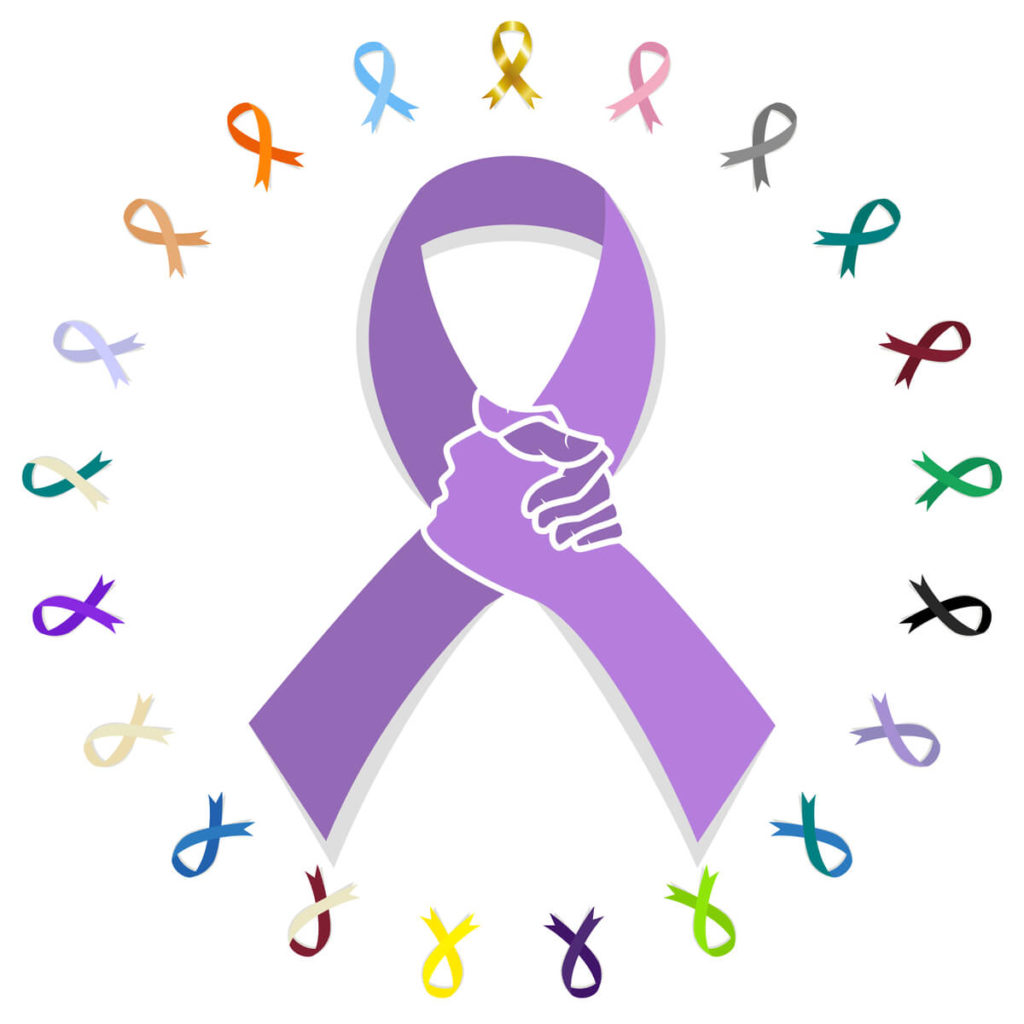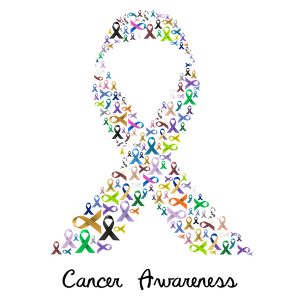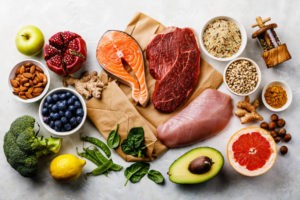Reducing Cancer Risks During “Cancer Control Month” This April

In the United States, “National Cancer Control Month” is observed each year during the month of April. Cancer Control Month is a time to focus on what you can do to reduce your risk of cancer, and a reminder to all Americans that awareness surrounding the factors that may cause or prevent cancer should be paid attention to. The month also focuses on raising awareness of the importance of living a healthy lifestyle, as well as the importance of having cancer screenings.
In the United States, men have nearly a 1/2 lifetime risk of developing cancer; for women, the risk is closer to 1/3. While we know there is no cure for cancer, studies are now showing that 30-40 percent of occurrences of cancer may, in fact, be counteracted with dietary measures.
According to the American Institute for Cancer Research, lifestyle changes, along with early detection, can help prevent nearly half of the most common cancers. In particular, your diet is one of the most important factors under your control that can reduce your risk. In fact, nutrition guidelines for cancer prevention are similar to those for preventing other diseases including heart disease and diabetes.
In our new blog, NJdiet will discuss how to use this month as a reminder to lessen your risk of being
diagnosed with cancer by making the necessary dietary changes. A healthy diet is one of the ways you can aim to fend off cancer—and protect your body against other diseases as well.
INCREASING AWARENESS
According to statistics, most of us have been affected by cancer in one form or another. Either yourself, a friend, or a family member may have been given a cancer diagnosis at some point. Fortunately, for many years deaths due to cancer have steadily declined. This is due in part to better education and heightened awareness about how to prevent certain types of cancer, recognizing the signs and symptoms of cancer, and knowledge on how to seek proper treatment. During the last decade, cancer-related deaths have continued to drop year after year, but it’s important to remember all that needs to be done to help keep cancer-related deaths at bay.
CANCER RISK FACTORS
Research has shown that lifestyle decisions may help to reduce your cancer risk factors. Cancer researchers have identified several lifestyle decisions that Americans can make to reduce their risk of cancer, such as quitting tobacco, eating healthier, exercising regularly, using sun protection and undergoing recommended screenings. Risk factors include:
- Age: over 75% of cancers are in people 55+
- Tobacco Use
- Poor Nutrition
- Heavy Drinking
- Physical Inactivity
- Exposure to Cancer Causing Agents at Work
- Prolonged, Unprotected Exposure to Sunlight
Research has shown that not only does exercise help prevent cancer, it also increases survival chances for those diagnosed with cancer. Even a modest amount of exercise can have great benefits, as long as it becomes a regular, daily habit. In fact, exercise has been shown to reduce the risk of colon cancer and possibly uterine, ovarian, lung and thyroid cancer.
GUIDELINES THAT HELP REDUCE YOUR CANCER RISK
Here are some general diet guidelines to help reduce your cancer risk.
- Maintain A Healthy Weight: Limit foods with added sugars and fats that provide a lot of calories but few nutrients.
- Consume A Variety Of Vegetables Fruits, And Grains: Fill half your plate with fruits and vegetables and make at least half your grains whole grains.
- Control Your Protein: Choose a variety of protein foods, including seafood, poultry, lean meat, legumes, eggs and nuts.
- Limit Alcohol Consumption: If consumed at all, limit alcoholic drinks to no more than one drink daily for women and two for men.
- Reduce Salt/Sodium Intake: Read food labels to learn exactly how much sodium is in a product, and do not add extra salt to your meals.
DIETARY CHANGES TO CONTROL YOUR CANCER RISK
One of the most important aspects of healthy living is following a healthy diet. Incorporating a healthy diet into your lifestyle can not only maintain your health, it may lower many of the risk factors before cancer can occur. While your cancer risk factors are determined by a variety of factors — from your genes and your environment, to your age and race — an overall healthy, balanced diet is an equally important factor.
Research supports that there are some foods in particular that are beneficial when it comes to cancer prevention. They include:
- Broccoli: Broccoli has long been known as a cancer-prevention food, and research found high amounts of potentially anti-cancer compounds in broccoli and broccoli sprouts. Cauliflower, brussel sprouts and kale are also cancer- preventative foods.
- Garlic: Garlic has long been known for it’s cancer protection qualities and the strongest evidence of cancer defense is for onions and garlic against digestive tract cancers—and other research suggests garlic lovers are less likely to develop pancreatic and breast tumors.
- Beans: Beans are filled with fiber and protein, which could help you feel full and lower your risk of obesity (thus, lessening your cancer risk). The high fiber content in beans feeds the healthy bacteria in the intestine and keeps the cells lining the digestive tract healthy, minimizing cancer risk.
- Berries: Berries are known to have cancer-fighting phytonutrients and high amounts anthocyanins, which helps slow down the growth of cancer cells.
- Nuts & Seeds: High nut consumption was strongly associated with a reduced risk of certain cancers in both women and men, and researchers point to a number of compounds contained in nuts that appear to slow cancer.
- Tomatoes: Studies have found that higher total tomato consumption is associated with reduced risk of prostate cancer. Tomatoes are the best dietary source of lycopene, which according to various studies, stop endometrial cancer cell growth.
Also it is worth mentioning that to increase wellness in your diet and to have it positively affect the most important thing of all – your health – it is important to remove the following dangerous, cancer-causing items from your diet. They include:
- Refined Sugar: The biggest cancer causing food is high-fructose corn syrup (HFCS) and other refined sugars. Refined sugars (and foods made with them) are the source of major insulin spikes and feed the growth of cancer cells. Healthier options include organic honey, coconut sugar, or maple sugar.
- Farmed Fish: Farmed fish, especially farmed salmon, is very bad for you in terms of your cancer-risk. It contains chemicals and pesticides, which have been shown to increase cancer risk when ingested. Additionally, most farm-raised salmon contains mercury and dioxins, both of which have also been shown to increase cancer risk.
- Genetically Modified Foods: Genetically modified organisms (GMOs) can be found in just about any unnatural food, and those foods contain chemicals that have been shown to increase the growth rate of tumors and the risk of most types of cancers. Avoid GMOs and stick to certified organic foods and certified non-GMO foods to decreasing your risk of developing cancer.
- Soda and Carbonated Beverages: For decades soda has been identified as a major cancer-causing product. Containing high-fructose corn syrup (HFCS), dyes, and other chemicals, soda provides zero nutritional value and depletes your body of nutrients. Additionally “diet” sodas, contain artificial sweeteners, which are also incredibly bad for your health.
- White Flour: All nutritional value is removed from white refined flour, and it’s glycemic index is high, which spikes insulin levels. Simple sugars and refined carbohydrates are known to fuel certain cancers.
- Hydrogenated Oils: Hydrogenated oils are packed with unhealthy omega-6 fats and have been proven to alter the structure of our cell membranes, increasing cancer risk.
- Canned Goods: Most cans are lined with a product called bisphenol-A (BPA), which has been shown to genetically alter the brain cells of rats. Instead enjoy fresh or frozen vegetables that have no added ingredients.
- Processed Meat: Processed meat, such as lunch meat, bacon, and hot dogs, contain chemical preservatives designed to keep them fresh for a long time, but unfortunately, the sodium and nitrite used in doing so increase the risk of cancer, especially colon cancer.
While this is just a sampling of the many items that have been known to increase the risk of cancer, the most important thing is to eat a healthy, balanced diet and avoid the processed foods we often tend to gravitate towards. The best way to protect yourself and to improve your overall health is to eat a clean, all-natural diet.
Although there are several other months during the year that are dedicated to the awareness of specific types of cancers, National Cancer Control Month is a great time to look into MANY ways to prevent cancer and its treatment complications.
Thus, the goal of National Cancer Control Month is for Americans to lead healthy and productive lives, with the hopes that by educating yourself and doing research, we can help in the decline of cancer-related deaths in the near future.






